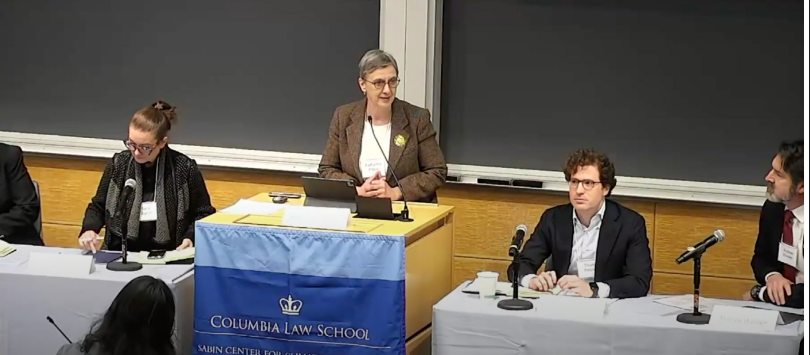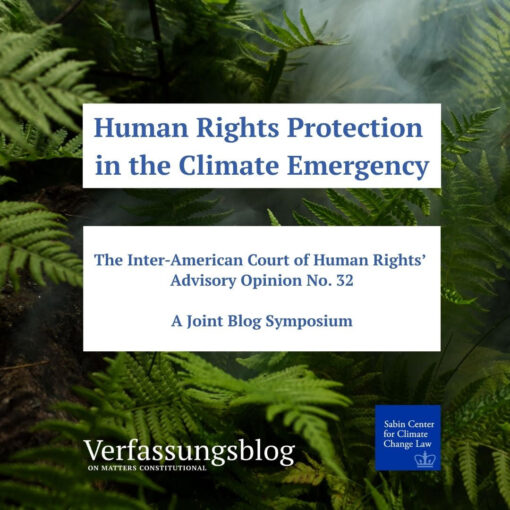
Note: The views reflected in the post are those of the author and the author alone, and do not necessarily reflect the views of the Sabin Center or anyone at the Sabin Center.
At a colloquium co-sponsored at Columbia Law School by the Ira M. Millstein Center for Global Markets and Corporate Ownership and the Sabin Center for Climate Change Law, two fields that usually do not touch on each other joined to discuss an essential topic: the relationship between fiduciary duty and responsibility for climate action. You can read one summary of main themes from the colloquium by the organizers here. I have been invited to share a version of my reflections as an academic observer of the colloquium, which I’ve previously published (with more extensive footnotes) in the Columbia Law School Blue Sky Blog on Corporations and the Capital Markets.
It almost goes without saying that despite the recently prevailing political winds in the United States and elsewhere, climate science is “unequivocal” in its findings that human-caused atmospheric damage is increasingly severe and many related physical risks to humanity and other life on Earth are rapidly intensifying. A major cause is economic activity which relies on the production, sale, and use of fossil fuels (i.e., coal, oil, and gas) which emit carbon dioxide when burned. Methane emissions and deforestation are other causes, and they are also most often associated directly with human economic activities. The negative consequences of human-induced climate disruption are already apparent in increasingly damaging storms, floods, heatwaves, wildfires, droughts, and waves of involuntary human migration. If present trends continue, and if humanity continues to burn fossil fuels at its current rate, the consequences will get much worse. The younger generations in the world today and those coming after them in the foreseeable future will be radically impoverished and many people will die from direct physical effects. A foundational question posed at the Columbia colloquium is how corporate law and its standards of fiduciary duty relate to what many climate scientists now call the “climate emergency.”[i]
Unfortunately, under what I will call the Maximization Model of fiduciary duty in the United States and many other jurisdictions, the answer is that there really is a fiduciary duty to destroy the climate when doing so will maximize profits for firms and investors. This means that the leaders of U.S. corporations and institutional investors owe a fiduciary duty to maximize profits through economic activities that continue to produce, sell, and use fossil fuels (i.e. coal, gas, and oil) without considering how to contribute to a global economic transition toward more climate-friendly sources of power (such as solar, wind, hydro, geothermal, and nuclear). In addition, if profits can be maximized by deforestation or releasing methane or other greenhouse gases as well, then profits must again take precedence. More on the Maximization Model of fiduciary duty in a moment.
At the colloquium, several scholars reported that some jurisdictions in the world – and some U.S. states – allow for a more moderate and permissive interpretation of fiduciary duties. Professor Cynthia Williams said, for example, that Canada’s national-level corporate fiduciary duty explicitly includes “the environment” among the relevant considerations. The relevant Canadian statute provides that “Every director and officer of a corporation in exercising their powers and discharging their duties shall (a) act honestly and in good faith with a view to the best interests of the corporation; and (b) exercise the care, diligence and skill that a reasonably prudent person would exercise in comparable circumstances.” “Best interests of the corporation” is further defined to include “the following factors:” (a) “the interests of shareholders, employees, retirees and pensioners, creditors, consumers, and governments; (b) “the environment;” and (c) the long-term interests of the corporation.”
Canada’s statute is an updated version of what have been called “constituency statutes” in the United States, which explicitly expand the fiduciary duties of corporate managers and directors “beyond shareholders” but do not usually include “the environment” among allowable factors, except in Arizona and Texas. Approximately two-thirds of U.S. states have constituency statutes, but not yet, importantly, the great corporate law state of Delaware. At the colloquium, former Delaware Supreme Court Chief Justice Leo Strine reiterated that, as a matter of current law, corporate fiduciary duties continue to focus solely on the interests of profits for shareholders.
In the Netherlands, courts have recently found that the nation’s corporate fiduciary duty laws not only permit but also require consideration of climate risks and damage that a firm may be causing. This development appeared to follow a movement among Dutch corporate law professors arguing for expanding corporate fiduciary duties to include “societal responsibility.” In 2021, a court in the Hague found that Royal Dutch Shell violated its fiduciary duties under Dutch law by failing to address its climate risk adequately and ordered the company to “reduce CO2emissions by net 45% by the end of 2030” against a 2019 baseline. On appeal, quantification of a reduction target was nullified, but the overall holding of a fiduciary duty to consider climate risks was affirmed.
After Royal Dutch Shell reincorporated in the United Kingdom, a follow-up lawsuit accused the company’s directors of violating their fiduciary duties under UK law. As Professor Thom Wetzer noted at the Columbia colloquium, however, this case was dismissed because the court found that the plaintiff, ClientEarth, brought the case for improper purposes. It was a close call for Shell, though, because the UK corporate fiduciary statute, like Canada’s, includes “the environment” as a relevant factor in the exercise of fiduciary duty, and the facts alleged by ClientEarth were compelling. Specifically, ClientEarth claimed that Shell had made a “net zero” carbon dioxide emission pledge as in the long-term interests of the corporation and its shareholders but did not put in place an actual or realistic plan to achieve this target. This allegation, if true, would seem to violate a basic fiduciary duty to be honest and trustworthy.
The European Union also appeared momentarily ready to adopt an EU-wide change in corporate fiduciary duties as part of its “Green Deal” legislation, which would have included legal responsibility for climate risk, but this proposal was deleted – even before a more general rollback of the EU legislation was recently announced.
Except perhaps in the Netherlands, then, there is no mandatory fiduciary duty for corporate directors and managers to consider the climate as a reason to mitigate their reliance on fossils fuels or take other pro-climate actions that would reduce profits for “the corporation and its shareholders.” (Note that some commentators and advocates tend to swallow the conjunction to say only “profits for the shareholders.) Shareholders are people too, however, and so one can argue that the permissive scope of corporate fiduciary duties should allow for the adoption of climate-friendly policies if they generally enhance shareholder “welfare” rather than profits. Also, there is wiggle room in arguments favoring the “long-term” interests of shareholders, though future generations of not-yet-existing “shadow shareholders” are unlikely to be included. (Cf. Thomas Hale’s recent treatment of “shadow interests” of future generations in the context of current climate policy.) “Enlightened shareholder value” is another expansive formulation into which climate concerns might be smuggled. The business judgment rule and procedural impediments to shareholder lawsuits still protect significant discretion to adopt some climate-favorable policies and actions in the United States and elsewhere.
At the colloquium, Professor Roberto Tallarita drew on an old-school jurisprudential distinction by the legal philosopher Wesley Hohfeld to suggest that corporate directors and managers may have the “privilege” to consider the climate problem in their decision-making but not a corresponding “duty.” This theoretical approach may not satisfy those who see the climate emergency as urgent – and indeed urgent enough to ground an imperative moral duty to act. Essentially, under the traditional view of corporate fiduciary duty, caring about the climate may sometimes be permitted but not required. There may be a “privilege” to care about the climate but not a mandatory “duty.”
If this were not bad enough, there is another level of fiduciary duty that is more problematic in requiring profit maximization even when it means contributing to climate damage. As scholars including some of my colleagues at the Wharton School have observed, the effects of broadening the corporate governance standard for fiduciary duties are substantially countered by narrower financial fiduciary duties that apply to institutional investors. Without going into the details, a pecuniary standard is applied for many investment fund managers that essentially requires profit maximization. Even if a corporate board may have significant leeway to consider climate issues, its investors may insist on a narrower financial focus: or else! Companies with low profits and shareholder returns may well find themselves the targets of hedge fund activists or private equity hunters. Hard-core profit-maximizing investors may act to achieve their own financial objectives whether the corporate directors and managers of operating companies like it or not. Often, the current owners and managers of a target are given a lucrative “offer that they can’t refuse,” which lightens the burden for them (though often not other business participants such as employees who are often downsized as a result).
The Maximization Model of fiduciary duty lies at the center of the problem. According to this approach, which has been most influentially and succinctly expressed by Milton Friedman, the focus of corporate directors and managers must be on profits alone. To maximize profits becomes the preeminent corporate fiduciary duty. For Friedman, the climate crisis (if he had considered it) would count as simply another kind of “pollution” or “social responsibility” issue which corporate directors and managers should ignore. He believed that economic externalities of this kind should be handled by government. Friedman recognized law and (to an uncertain extent) ethics as legitimate constraints on the profit motive. So one might think that Friedman allowed for moral arguments for a “climate imperative” in business. Nevertheless, the shareholder profit-maximization model is taught today in many business schools and law schools as the definition of corporate fiduciary duty.
A large hole in Friedman’s Maximization Model is his assumption that business and its profit calculations are separable from the political system that is supposed to adopt laws to control pollution and other externalities. If the influence of Elon Musk and the big oil and gas companies has taught us anything in the 2024 U.S. national election, it is that one cannot depend on an independent political system to check business operations, at least not in the United States after the ironically named Citizens United case and its progeny.
Consider also the decades-long failure of international governance regimes to regulate the climate problem effectively. As one scholar recently writes:
In 1992, countries promised, in international law, to “prevent dangerous anthropogenic interference with the climate system.” In the decades that followed [the adoption of the first treaties at the Earth Summit in Rio de Janeiro], countries met again, and again, and again, but “dangerous anthropogenic interference with the climate system” got worse. It has been suggested that doing the same thing again and again and expecting a different result is a definition of insanity.
Government regulation alone won’t get a handle on the “super wicked” and notoriously complex climate problem. As the well-known corporate lawyer William Savitt observed at the Columbia colloquium, the climate is “everybody’s problem,” and it therefore becomes “nobody’s problem.”
Changing the fiduciary duties of corporate directors and officers, as well as institutional investors, to allow for a truly “reasonable person” standard to address the climate problem will not come easy, given the entrenchment of the Maximization Model in business and law. As a recent study indicated, teaching profit maximization as the “truth” of fiduciary duty also has a significant effect on how willing businesspeople are to support social or environmental causes that do not enhance profits. Even if one can show that the Maximization Model is too narrow, wrong, and dangerous, it will prove practically difficult to dispel.
Professors Dorothy Lund and Elizabeth Pollman have persuasively shown that there is today a “corporate governance machine” that reinforces a view that profit maximization for shareholders is fundamental. However, this view directly contributes to the climate crisis because the use of fossil fuels is ubiquitous in the economy. Maximizing profits is equivalent to supporting the ever-increasing discovery, production, sale, and use of coal, gas, and oil – and the ever-increasing climate damage that results. As James Gleick observes recently in a different context:
A machine is autonomous, defined by it own internal operations, self-regulating, and self-propelling. Step back a bit, though, and what looks like a marvel begins to seem monstrous.
So it is with the Maximization Model of corporate fiduciary duties. It has elegantly and efficiently served to encourage economic growth, and it nicely fits mathematical equations, but it has become monstrous by causing certain, foreseeable, and deadly climate damage.
Here are a few recommendations for reform.
- Stop teaching the Maximization Model as if it were a natural law. Fiduciary duties and business corporations are much older than the financial models of the firm that, at least since Milton Friedman, have popularized profit maximization for shareholders as an unalterable truth.
- Adopt laws that reject the Maximization Model and allow for the consideration of pro-climate corporate policies and actions as legitimate ends of business managers and investors. The Netherlands may be leading the way toward adopting a mandatory fiduciary duty to consider climate consequences in business decisions. At least, list “the environment” along with other business interests and concerns beyond shareholders in fiduciary duty statutes whether nationally (as in Canada and the UK) or at state or regional levels (as in Arizona and Texas). Although adopting a federal corporate statute of this kind is impossible to imagine in the United States at the moment, Delaware could make a major statement by adopting a version of a fiduciary duty statute that would include “the environment,” and maybe even specifically “the climate.” Other states with constituency statutes could amend them too. At the same time, fiduciary duties for institutional investors should be changed to permit and maybe even require pro-climate issues to be considered or at least fully and accurately disclosed.
- Push for international actions recommending that companies and institutional investors consider the climate emergency to be an important fiduciary issue. Although the Environmental, Social, and Governance (ESG) movement has been watered down in its mainstream version to be concerned only with profit maximization, it could recover its original purpose expressed by the United Nations, including addressing the climate crisis, through creative legal interpretation and reform.
Is there really a fiduciary duty to destroy the climate? The short answer is yes. As long as profit maximization is the fiduciary duty standard for corporate governance and institutional investors, the law will continue to contribute to the climate problem.
Unlike other externalities, climate damage is a ubiquitous consequence of our fossil-fuel economy. “Drill, baby, drill” leads inexorably to “burn, baby, burn.”
Because the climate is everybody’s problem, everybody, including businesses and investors, should contribute to preserving it. Fiduciary duties must change, even if that will be very difficult. For as Paul Hawken said more than three decades ago: “There is no polite way to say business is destroying the world.” There is a moral duty to stop doing so, which should translate also into legal fiduciary duties.
This post was originally published on Columbia Law School’s Blue Sky Blog here and is inspired by a colloquium on “The New Climate Fiduciaries” jointly sponsored by the Sabin Center for Climate Change Law and the Millstein Center and held at Columbia Law School on February 21, 2025.

Eric W. Orts
Eric W. Orts is the Guardsmark Professor of Legal Studies & Business Ethics and Management at the Wharton School of the University of Pennsylvania. His books include Business Persons: A Legal Theory of the Firm and The Moral Responsibility of Firms, both published by Oxford University Press. He is a graduate of Oberlin College (BA), the New School for Social Research (MA), Michigan Law School (JD), and Columbia Law School (JSD). At present, he is teaching a core course in “Business, Social Responsibility, and the Environment” for Wharton MBAs.




